|
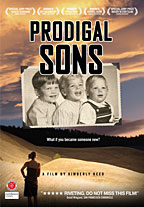
Prodigal
Sons
First
Run Features,
2008
Director:
Kimberly Reed
Starring:
Kimberly Reed
Carol McKerrow, Marc McKerrow, Claire Jones, Todd Loren McKerrow, Jasmine
Fuentes, Oja Kodar, Sasha Welles, Jakov Sedlar
Archive
footage:
Orson Welles,
Rita Hayworth
Unrated,
88 minutes
|
Citizen
Kim
by
Michael D. Klemm
A shorter version also appeared on abOUTmag.com,
Sept., 2010
Posted online August, 2010
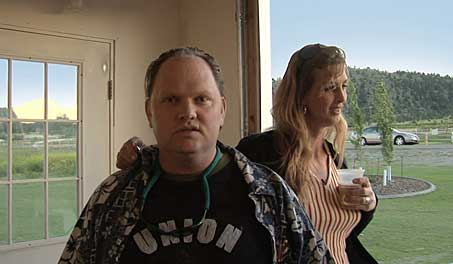
Expecting
one thing when viewing a film, and then finding something completely different,
is one of the pleasures of reviewing. Transgender transitions are a common
topic in queer documentaries. The subject is a compelling one but it is
also becoming very familiar. Prodigal Sons
(2008), a personal portrait by filmmaker Kimberly Reed, mines similar
territory and then ventures into uncharted waters.
Kim
grew up during the 1970s in Helena, a rural town in Montana. She is returning
home for a high school reunion. To say that much has changed in the interim
would be an understatement. When Kim attended her alma mater, she was
a he. His name was Paul McKerrow and he was the quarterback of the football
team. All the girls had a crush on him when he was a boy. Kim arrives
in Helena with her lover, Claire (Paul became Kim but Kim still likes
women) and doesn't know what to expect. "20 years ago they had voted me
most likely to succeed," Kim tells the camera, "I wonder if now they will
laugh at me." Though the town looks rather conservative, she has nothing
to worry about. "We're all old and fat and bald now, and she's a girl,"
laughs one of her old drinking buddies.
|
|
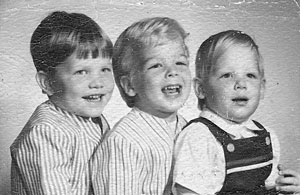 The
hometown already knows about her transition. Kim's mother, when widowed,
told friends that her husband had died but Kim "had been reborn." All
seems well for most of the first half hour but the film's title is plural
and I haven't introduced the other prodigal son yet. Marc is the
oldest of the three McKerrow brothers. (The youngest, Todd, is gay and
lives in San Diego.) Marc suffered a bad truck accident as a young man,
and later developed seizures and short term memory loss. Several surgeries
later, part of his brain was removed. He is not all there anymore and
prone to extreme mood swings. Kim has been estranged from Marc for over
a decade. While Marc was dealing with his medical issues, Paul was becoming
Kim. Kim is completely comfortable with herself but she needs to reconnect
with Marc - who is living in the past, unable to reconcile the past and
present versions of his sibling. The
hometown already knows about her transition. Kim's mother, when widowed,
told friends that her husband had died but Kim "had been reborn." All
seems well for most of the first half hour but the film's title is plural
and I haven't introduced the other prodigal son yet. Marc is the
oldest of the three McKerrow brothers. (The youngest, Todd, is gay and
lives in San Diego.) Marc suffered a bad truck accident as a young man,
and later developed seizures and short term memory loss. Several surgeries
later, part of his brain was removed. He is not all there anymore and
prone to extreme mood swings. Kim has been estranged from Marc for over
a decade. While Marc was dealing with his medical issues, Paul was becoming
Kim. Kim is completely comfortable with herself but she needs to reconnect
with Marc - who is living in the past, unable to reconcile the past and
present versions of his sibling.
|
|
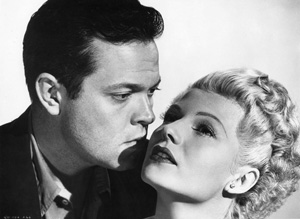 It
becomes clear that the central conflict is going to be between Kim and
Marc. It is worth noting that Marc's objections to Kim's choices don't
stem from any religious or moral grandstanding (at least not initially).
He is instead bothered that his sister would deny her past as a boy because
it is still a part of her whether she likes it or not. He is motivated
by his own identity issues. Marc was adopted and he is obsessed with finding
out who his birth parents are. The search leads to a conclusion that proves
the old adage that truth is stranger than fiction. Marc discovers that
his grandparents were Orson Welles and Rita Hayworth! The cinema
genius and the screen goddess. Marc's birth mother has died but Kim, with
cameras in tow, follows her brother when he is invited to Croatia by Oja
Kodar. She was the consort to Mr. Welles during the final two decades
of the filmmaker's life and she welcomes him as long lost kin. Mark revels
in his newfound identity and gets to wear Orson Welles' tuxedo. (Marc
isn't exactly thin, but the clothes are still huge on him.) Kim expresses
a bit of envy - she's the filmmaker yet he is the grandson
of the man who gave the world Citizen Kane. It
becomes clear that the central conflict is going to be between Kim and
Marc. It is worth noting that Marc's objections to Kim's choices don't
stem from any religious or moral grandstanding (at least not initially).
He is instead bothered that his sister would deny her past as a boy because
it is still a part of her whether she likes it or not. He is motivated
by his own identity issues. Marc was adopted and he is obsessed with finding
out who his birth parents are. The search leads to a conclusion that proves
the old adage that truth is stranger than fiction. Marc discovers that
his grandparents were Orson Welles and Rita Hayworth! The cinema
genius and the screen goddess. Marc's birth mother has died but Kim, with
cameras in tow, follows her brother when he is invited to Croatia by Oja
Kodar. She was the consort to Mr. Welles during the final two decades
of the filmmaker's life and she welcomes him as long lost kin. Mark revels
in his newfound identity and gets to wear Orson Welles' tuxedo. (Marc
isn't exactly thin, but the clothes are still huge on him.) Kim expresses
a bit of envy - she's the filmmaker yet he is the grandson
of the man who gave the world Citizen Kane.
|
|
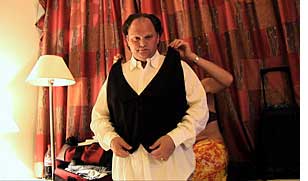 Much
of this has been charming but then the film massively shifts gears again.
Hell, it shifts tectonic plates! Marc's condition deteriorates and the
last third becomes a harrowing study in mental illness. I suppose I should
have been forewarned; he has a pretty good meltdown already during the
first half hour and he looked creepy from the beginning. Even so, I didn't
expect to see him turn almost homicidal in the last act. As he descends
into madness, he begins to invoke the Bible and his verbal attacks escalate
into physical violence against both of his siblings. Much
of this has been charming but then the film massively shifts gears again.
Hell, it shifts tectonic plates! Marc's condition deteriorates and the
last third becomes a harrowing study in mental illness. I suppose I should
have been forewarned; he has a pretty good meltdown already during the
first half hour and he looked creepy from the beginning. Even so, I didn't
expect to see him turn almost homicidal in the last act. As he descends
into madness, he begins to invoke the Bible and his verbal attacks escalate
into physical violence against both of his siblings.
|
|
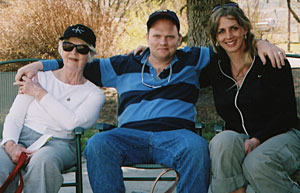 This
is quite a departure from most documentaries that explore gender transitions.
We see nothing of Kim's operations and this is usually the main event
in trans cinema. Kim is actually overshadowed by her brother's mental
illness and I'm sure this will lend the film more mainstream appeal. Sexuality
is huge, but it isn't the only thing that defines a person's identity
and this film examines many variations on this theme. Prodigal
Sons can almost be enjoyed as three separate movies. A
film, ideally, should be universal but the three acts could appeal to
vastly different audiences. Transgender people will be fascinated by Kim's
story. Cinephiles will embrace the Orson Welles interlude and everyone
will be shocked by the painful drama that swallows up the rest. This
is quite a departure from most documentaries that explore gender transitions.
We see nothing of Kim's operations and this is usually the main event
in trans cinema. Kim is actually overshadowed by her brother's mental
illness and I'm sure this will lend the film more mainstream appeal. Sexuality
is huge, but it isn't the only thing that defines a person's identity
and this film examines many variations on this theme. Prodigal
Sons can almost be enjoyed as three separate movies. A
film, ideally, should be universal but the three acts could appeal to
vastly different audiences. Transgender people will be fascinated by Kim's
story. Cinephiles will embrace the Orson Welles interlude and everyone
will be shocked by the painful drama that swallows up the rest.
Documentaries
often take on a life of their own. The director's original intention was,
no doubt, to record both the high school reunion and her brother's surprise
connection to Welles. Marc's third act meltdown almost functions like
the dramatic conclusion of a narrative film. Had this been fiction,
I would probably say that there is too much going on but I haven't been
made this uncomfortable by so much raw emotion in a documentary since
I first saw Crumb back in the early 90s. You couldn't make this
stuff up.
|
|
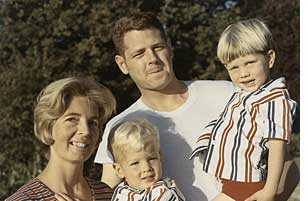 Before
the emphasis shifts to Marc, Prodigal Sons
really gets into the mind of a tranny - even though the sex change part
of her journey is long over with. Kim looks great and, as mentioned earlier,
she is completely comfortable as a woman. She is also ambivalent about
her past, a common reaction that many must have after undergoing sexual
reassignment surgery. She isn't rejecting her past, she just wants to
move on and her brother won't let her. It's obvious why Marc wants to
hold onto their shared past but it's also easy to see why Kim is uncomfortable
when he shows strangers pictures of her as a boy. Her partner remarks
that it took years for Kim to show her old photos. After her transition,
Kim just wanted to pass and to fit in, and told nothing of her past to
colleagues in New York City. She adds that most of her transsexual friends
actually burned their old photographs. Revealing observations like these
set this film apart and add considerable interest. Before
the emphasis shifts to Marc, Prodigal Sons
really gets into the mind of a tranny - even though the sex change part
of her journey is long over with. Kim looks great and, as mentioned earlier,
she is completely comfortable as a woman. She is also ambivalent about
her past, a common reaction that many must have after undergoing sexual
reassignment surgery. She isn't rejecting her past, she just wants to
move on and her brother won't let her. It's obvious why Marc wants to
hold onto their shared past but it's also easy to see why Kim is uncomfortable
when he shows strangers pictures of her as a boy. Her partner remarks
that it took years for Kim to show her old photos. After her transition,
Kim just wanted to pass and to fit in, and told nothing of her past to
colleagues in New York City. She adds that most of her transsexual friends
actually burned their old photographs. Revealing observations like these
set this film apart and add considerable interest.
|
|
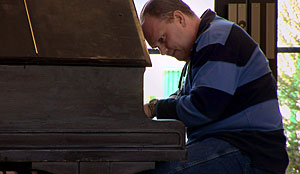 As
a documentary, Prodigal Sins
excels on both thematic and technical levels. Reed weaves a terrific tapestry
of both new and archival footage. Even Mr. and Mrs. Welles float in and
out. The use of old home movies is inspired. We see Kim playing football
in high school and the contrast is amazing. She was featured in the senior
yearbook with the slogan, "Paul McKerrow - the real man!" Pictures tell
a thousand words. Film buffs will savor seeing a ravishing Rita Hayworth
deliver a sultry torch song, in sensual close-up, from Welles' 1947 The
Lady From Shanghai. I noticed immediately that Prodigal Sons'
title card uses the same white typeface as Citizen Kane's opening
title. As
a documentary, Prodigal Sins
excels on both thematic and technical levels. Reed weaves a terrific tapestry
of both new and archival footage. Even Mr. and Mrs. Welles float in and
out. The use of old home movies is inspired. We see Kim playing football
in high school and the contrast is amazing. She was featured in the senior
yearbook with the slogan, "Paul McKerrow - the real man!" Pictures tell
a thousand words. Film buffs will savor seeing a ravishing Rita Hayworth
deliver a sultry torch song, in sensual close-up, from Welles' 1947 The
Lady From Shanghai. I noticed immediately that Prodigal Sons'
title card uses the same white typeface as Citizen Kane's opening
title.
I've
watched more than a few forgettable queer films over the years but this
isn't one of them. I will never forget this one. In closing, Prodigal
Sons is a gripping documentary with crossover appeal. The
DVD also includes follow-up interviews and a Q&A from the festival circuit.
|

